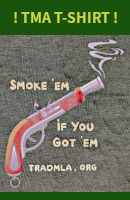A trained British soldier could sometimes get off three shots a minute and that was using paper cartridges where the powder and ball was in one package. Try doing that yourself. Now try getting off three aimed shots.
A few years ago, I could. BUT, it takes A LOT of practice AND you must stay in practice.
British troops were discouraged from aiming because it slowed the rate of fire.
Actually another one of our myths about the Revolution. Much like the Brits fought in a line and we won because we his behind trees.
"have at the breech a small sight channel made, for the advantage and convenience of taking better aim."
-Major General the Earl of Cavan
"...proper marksmen to instruct them in taking aim, and the position in which they ought to stand when firing."
-Lt. General Gage, order concerning new recruits and drafts received 3 days prior to Bunker Hill.
"The regiments are frequently practiced at firing with ball at marks....and premiums are sometimes given for the best shots, by which means some of out men have become excellent marksmen."
-Lt. Fredrick Mackenzie, 23rd Regiment of Foot. Boston, Jan. 1775
"PRESENT!...and raise up the Butt so high upon the right Shoulder, that you may not be obliged to stoop too much with the Head, the right Cheek to be close to the Butt, and the Left Eye shut, and look along the Barrel with the right eye from the Breech Pin [plug] to the Muzzel;"
-The Manual Exercise As Ordered by His Majesty, In 1764.
Mario




